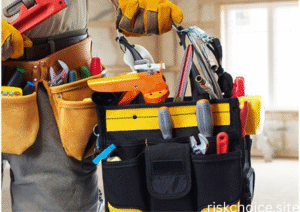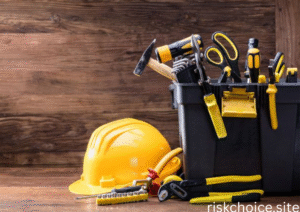
Whether you own your own handyman company or are a professional handyman, one important step you should never ignore: handyman business insurance. Your profession carries hazards whether you are doing electrical work, drywall repairs, or leaky faucets. One bad action could cause injury, property damage, or perhaps legal problems.
That is where handyman insurance finds application. This guide will walk you through what it is, why you should have insurance, and how to locate the finest coverage to guard your small business in 2025.
Describe handyman business insurance.
Handyman business insurance is a body of policies meant to guard handymen and their companies against typical hazards on the job. Among these can be claims for personal injury, property damage, equipment loss, and more.
From general repairs to minor construction and maintenance, most handyman insurance packages are designed to cover a range of operations. The insurance needed could change based on the services you provide.
Why Would You Want Handyman Insurance?
You could ask, “I’m just doing small jobs—why would I need business insurance?” Actually, though, even the most talented handymen occasionally find themselves in unanticipated circumstances.
These are the main arguments for the need of handyman business insurance:
1. Legal Protection
Should a client claim damage to their property or injuries, you can find yourself in legal hot water. Legal fees, settlements, or judgments would be personally liable for without insurance.
2. Contractual Trust for the Client
Before they will hire you, many clients—especially those in commercial real estate management and landlords—need evidence of insurance. Having handyman insurance lends credibility and improves your chances of winning higher contracts.
3. Coverages for Mistakes
Insurance can pay for repairs or medical fees should you unintentionally break a wall while installing shelves or have a customer trip over your ladder and sustain injuries.
4. Coverage for Your Instruments
Your tools define your livelihood. Should they be stolen or damaged, your insurance cover will enable prompt replacement, therefore reducing downtime.
5. Mental Harmony
Knowing that you are covered helps you to concentrate on your strongest suit—great service—instead of always worrying about worst-case events.
Types of Handyman Business Insurance
Let’s separate the major forms of insurance handymen usually require:
1. Liability Insurance Generally
handyman business insurance is built on this. It covers:
Third-party body damage
Damage of property
Legal defenses: expenses
Both personal and commercial damage
For instance, general liability insurance would pay for the new TV should you unintentionally knock over one while working.
2. Professional Risk Insurance
Also referred to as errors and omissions insurance, this protects allegations of negligence or inadequate work resulting in client losses.
For instance, this coverage can cover water damage weeks later resulting from a repair you did.
3. Business Vehicle Insurance
Personal auto insurance won’t cover events involving business use of a work van or truck. Handyman companies with vehicles must need commercial auto insurance.
4. Equipment and Tool Coverage
Should your tools and equipment be stolen, lost, or damaged on the job or in route, this covers them.
5. Worker’s Compensation Insurance
Most states, if you have employees, mandate workers’ comp. It spans:
Medical invasions
Income lost
Fees for rehabilitation
Benefits from death (in worst-case situations)
The Business Owner’s Policy, or BOP
At a reduced price, a BOP bundles property insurance and general liability coverage. Small handyman companies with an office or equipment storage site will find this perfect as well.
Handyman Business Insurance Prices: How Much?
Several elements affect the cost of handyman insurance:
Where you are located
The goods and services you provide
Your annual income.
workforce count
Type and worth of the tools
History of past claims
Depending on your coverage requirements, handyman business insurance usually runs from $50 to $200 a month.
Here is a basic breakdown:
Type of Insurance Average Monthly Expense
Overall Liability 50–75 dollars
Instruments and Tools: Equipment 10 to 30 dollars.
Employees’ Compensation $80 – $150 Commercial Auto $100 – $200
Usually, paying annually or combining several insurance will help you to reduce your premium.

How to Purchase the Best Handyman Insurance for 2025
Finding the correct insurance is not difficult. These pointers help to smooth out the process:
Examine Your Company’s Risks
List first the services you offer and the kind of customers you deal with. Do you ladder climb? Use electricity at work. Go daily to several destinations by drive. You will require greater coverage the more hazards that are involved.
2. Contrast Quotations
Always seek many quotations from respectable small business insurance companies. Search for client reviews, choices for coverage, and financial ratings.
3. Dealing with a broker
Helping you evaluate several policies and get the best value for your money is what insurance brokers do. Many become experts in trades and building companies.
4. Inquire on Discounts and Bundles.
Getting a Business Owner’s Policy or combining general liability with tools insurance will often help you save money. Remember to inquire about pre-payment or discounts for claims-free history.
State Handyman Insurance Guidelines
Every state requires distinct licenses and insurance for handymen. Like this:
California calls for general liability insurance and a contractor’s license for jobs over $500.
Florida: Promotes liability insurance, but unless you are a licensed contractor, it is not required.
Texas: Although many customers want confirmation of insurance, handymen are not obliged to have any state licensing.
Review laws in your state before starting or expanding your company. Usually, the Department of Labor or Licensing website of your state provides this information.
Should you not have insurance, what happens?
While running without insurance may appear like a cost-cutting strategy, over time it will really cost significantly more. Think on the following situations:
Moving tools damages a client’s floor, and you have to pay $3,000 out of pocket.
A customer sues you for a botched repair that resulted to water damage—legal fees alone cost $10,000.
Tools inside your work van worth $5,000 have been taken.
Without insurance, these expenses are out of your pocket and could destroy your company.
Typical Mistakes to Steer Clear of
Look for these traps when shopping for handyman business insurance:
Underinsuring your business: Make sure your coverage limits match the genuine risk level of your work.
Skipping commercial auto insurance: Personal auto won’t cut it if you drive for business.
Not reading the fine print: Learn what is covered as well as what is not.
Letting insurance expire: You run significant financial danger even from a brief coverage lapse.
Final Thoughts
Having appropriate handyman business insurance guarantees your future rather than only safeguarding your company. Accidents, injuries, and property damage are all part of the work, but you don’t have to confront them alone.
Investing in good insurance coverage will save you time, money, and stress down the road whether your firm is small team operated or lone handyman just starting out.
Review your needs first; then, compare estimates and speak with an insurance agent. Having the correct policies in place will free you to concentrate on what is important—providing your customers with high-quality services.
Suggestions for Ad copy:
Headline: Protect Your Handyman Business—Get Insured Today!
Body: Let an accident destroy your income or reputation instead of Get affordable, tailored handyman business insurance in minutes. Liability, tools, auto, and more—tailored for your needs. quick quotations Supported by thousands of experts.
CTA (Call to Action): Get Your Own Free Quote Right Now!
